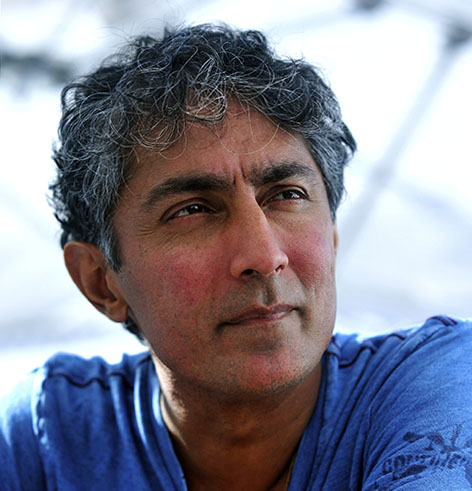When Arun Lakra started to feel a bit off-kilter, even downright cranky, during his second year of medical school at U of T, he thought a creative outlet might help. He entered a student short-story contest in the Faculty of Medicine – though he’d never written one before – and won. Then he did it again the next year.
“I really had no method other than indulging a part of my brain that felt like it needed to be indulged,” says Lakra (MD 1990), now an ophthalmologist and award-winning playwright. This week his play Sequence has its Toronto debut at the Tarragon Theatre.
By the time Lakra graduated as a full-fledged ophthalmologist, he had a full-blown passion for writing. And he wasn’t willing to give it up.
“There was no particular moment when I said, ‘Hey, I want to be a writer.’ Towards the end of my ophthalmology residency at U of T, I just realized that it was part of who I was and wanted to be,” he says. “Then I had to figure out if it was possible to pursue both and, if so, how.”
Over the last two decades, Lakra has divided his time between his ophthalmology practice in Calgary and writing. Sequence is his first and only play, and it explores luck, probability, science and faith. “There are two stories that intertwine and ask big questions about order – whether it matters in our lives, in the universe and in the stories,” he says, noting that the play is structured like the twisting double helix of a DNA molecule. In one story, a man successfully bets on the Super Bowl coin toss 20 years in a row, while in the other a professor races toward a cure for the disease causing her own progressive blindness. The play had its world première in 2013 in Calgary and has received several honours, including the Joanne Woodward/Paul Newman Award for Drama at the Bloomington Playwrights Project in Indiana.
For Lakra, the play’s run at the Tarragon (January 3 to February 12) is momentous for a couple of reasons. “I’m thrilled that it’s made it into a theatre of this stature, and I’m excited to have it in a place I called home for many years while I was at U of T.”
On January 13, U of T’s Program in Health, Arts and Humanities and the student humanities blog Artbeat are co-hosting an evening at the theatre featuring Lakra in conversation with the play’s director, Andrea Donaldson. For many of his friends and colleagues in the city, it will be the first time they encounter the man they know as a doctor in his other life as a professional writer.
While he is best known as a playwright, Lakra’s writing projects have spanned multiple genres. Some of his recent projects include a script for a feature film – a supernatural thriller – currently in development, an animated music video that won the Best Music Video Award at the 2015 Toronto Independent Film Festival, an album of original songs and a screenplay for a short film called Probability (based on Sequence) that toured the film festival circuit this past fall.
After juggling writing and medicine for more than two decades, Lakra realized he’d learned a few things about maintaining dual careers, and it might be helpful to others. He developed a theory called “subplotting,” which counsels people to build a secure career while still pursuing a subplot – a passion that’s financially risky, but something they’re not willing to let go of. The idea came out of discussions with his wife about what advice they’d give their two children when it comes to the persistent message in pop culture to “follow your passion.”
“I realized that there might be some validity in what I was doing with my writing. I’m following my passion, but I’m following it in a different way,” says Lakra. “Many of us are over-committing to these pursuits, or neglecting them – leaving them to the weekend hobby. I think there’s a spot in the middle of this continuum where we put time and energy into our interests, but not to the all-in extreme.” Lakra spreads the word about subplotting through public speaking engagements, and he has a book proposal in the works.
The division between medicine and writing may look neat and tidy in his calendar, where certain days are devoted to each pursuit, but the reality can be messy, he says. “I always feel like I’m neglecting something. And there are times when I think about complicated patients when I should be writing, or my mind drifts to plot points when I’m working at my ophthalmology practice.”
Despite the competing demands, Lakra feels fortunate to be living his double life and wouldn’t give up medicine, even if he could. “If all my time, energy and brain power were directed toward the creative side, I think I’d feel the absence of the analytical medical side,” he says. “It’s all about balance.”






